
AMERICAN NATURALIST
Scope & Guideline
A Premier Hub for Ecological and Evolutionary Research
Introduction
Aims and Scopes
- Evolutionary Ecology:
Research that investigates the interactions between evolutionary processes and ecological dynamics, including traits, behaviors, and environmental adaptations. - Ecological Interactions:
Studies focused on the complex relationships among species, including competition, predation, mutualism, and their impacts on community structure. - Adaptation and Phenotypic Variation:
Exploration of how organisms adapt to their environments through phenotypic plasticity and genetic changes, often in response to ecological pressures. - Biodiversity and Conservation:
Investigation into patterns of biodiversity, the effects of habitat changes, and the implications for conservation strategies. - Population Dynamics:
Research examining the factors that influence population size, structure, and distribution, integrating both ecological and evolutionary perspectives. - Theoretical and Mathematical Models:
Development and application of models to understand complex ecological and evolutionary processes and predict future trends.
Trending and Emerging
- Climate Change Impacts:
An increasing number of studies are addressing the effects of climate change on species interactions, population dynamics, and ecosystem functions, underscoring the urgency of understanding ecological responses to global change. - Microbial Ecology and Evolution:
There is a growing focus on the role of microbiomes in ecological interactions and evolutionary processes, highlighting the significance of microbial communities in shaping host traits and ecosystem dynamics. - Genomic and Molecular Approaches:
Research utilizing genomic tools to explore evolutionary questions is on the rise, reflecting advancements in technology and a broader interest in understanding the genetic basis of adaptation. - Social Behavior and Network Dynamics:
Emerging themes in the study of social structures and behaviors among species, particularly in social insects and vertebrates, are gaining traction, emphasizing the role of sociality in ecological and evolutionary contexts. - Eco-Evolutionary Dynamics:
An increased emphasis on the interactions between ecological and evolutionary processes over time is evident, with studies exploring feedback loops and their implications for biodiversity and ecosystem stability.
Declining or Waning
- Traditional Behavior Studies:
Research centered on established behavioral studies without integrating evolutionary or ecological frameworks has become less frequent, as there is a growing preference for interdisciplinary approaches that connect behavior with ecological and evolutionary contexts. - Descriptive Ecology:
Papers that primarily describe ecological phenomena without deeper analytical or theoretical insights have declined, as the journal increasingly favors studies that provide mechanistic explanations. - Single-Species Focus:
Research focusing solely on individual species without consideration of broader ecological interactions is waning, reflecting a trend towards more holistic studies that examine community dynamics. - Static Models of Ecosystems:
The use of static, non-dynamic models to depict ecological interactions has decreased, with a shift towards more complex, dynamic modeling that accounts for temporal changes and interactions.
Similar Journals
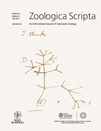
ZOOLOGICA SCRIPTA
Championing impactful studies in ecology and behavior.Zoologica Scripta, published by Wiley, stands as a distinguished journal within the fields of Animal Science and Zoology, Ecology, Evolution, Behavior and Systematics, Genetics, and Molecular Biology. With its inception dating back to 1971 and a convergence year extending to 2024, this journal consistently provides a platform for high-quality research, earning a Q1 ranking in two key categories and solid performance in additional fields, as evidenced by its significant Scopus rankings and impressive percentiles. Notably, it ranks 36 out of 490 journals in Animal Science and Zoology, placing it in the 92nd percentile. While Zoologica Scripta operates under a traditional access model, its rigorous peer-review process ensures that only the most impactful studies make their way into its pages. With a focus on advancing our understanding of biodiversity and evolutionary processes, this journal is indispensable for researchers, professionals, and students committed to the ongoing exploration of animal sciences and ecological studies.
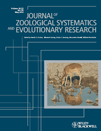
JOURNAL OF ZOOLOGICAL SYSTEMATICS AND EVOLUTIONARY RESEARCH
Advancing the Frontiers of Zoological KnowledgeThe Journal of Zoological Systematics and Evolutionary Research, published by Wiley-Hindawi, stands as a premier academic journal since its establishment, showcasing cutting-edge research in the fields of Animal Science, Zoology, and Ecology. With an impressive track record spanning from 1963 to the present, this journal has earned a Q1 classification in both Animal Science and Ecology, as well as recognized rankings in Genetics and Molecular Biology. Its impact is highlighted by its Scopus ranks, placing it in the top percentile for relevant categories, underscoring its vital role in advancing knowledge and understanding within these disciplines. Researchers, professionals, and students will find a wealth of high-quality, peer-reviewed articles that contribute to the evolutionary understanding of biodiversity and systematics. Though not an Open Access journal, it remains accessible to a wide audience committed to exploring the intricacies of zoology and evolutionary biology.
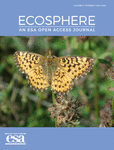
Ecosphere
Unveiling the dynamics of ecosystems through open access.Ecosphere is a leading open-access journal published by WILEY, dedicated to advancing research in the fields of ecology, evolution, behavior, and systematics. Established in 2010 and headquartered in the United States, this innovative journal provides a platform for the exchange of cutting-edge scientific knowledge and discovery, fulfilling its mission to enhance our understanding of ecological systems and their interactions. With a prestigious impact factor reflecting its commitment to high-quality research, Ecosphere is ranked Q1 in both Ecology and Ecology, Evolution, Behavior, and Systematics for 2023, further solidifying its prominence in the scientific community. The journal's scope includes a wide array of topics related to environmental science, making it an essential resource for researchers, professionals, and students aiming to stay at the forefront of ecological research. It offers comprehensive open access options, ensuring that groundbreaking findings are readily available to a global audience, thus fostering collaboration and innovation in the field.

EVOLUTIONARY ECOLOGY
Advancing Knowledge at the Intersection of Evolution and EcologyEVOLUTIONARY ECOLOGY is a prestigious academic journal published by SPRINGER, exploring the intricate relationships between evolutionary processes and ecological dynamics since its inception in 1987. As a key resource in the field of Ecology, Evolution, Behavior, and Systematics, the journal is recognized for its impactful contributions, holding a commendable Q2 quartile ranking in its category as of 2023. With an emphasis on empirical and theoretical studies that bridge evolutionary biology with ecological principles, EVOLUTIONARY ECOLOGY is essential for researchers, practitioners, and students aiming to deepen their understanding of biodiversity, adaptation, and ecosystem functioning. Although it currently does not offer open access, the journal maintains a commitment to disseminating high-quality research that influences both foundational knowledge and practical applications in the field. Located in the Netherlands, the journal continues to serve a global audience, making significant contributions to advancing ecological and evolutionary research through rigorous scientific discourse and innovation.
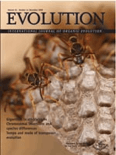
EVOLUTION
Shaping the Future of Evolutionary ResearchEVOLUTION is a premier academic journal published by Oxford University Press, dedicated to the dynamic fields of evolutionary biology, ecology, and genetics. Since its inception in 1948, the journal has established itself as a leading platform for innovative research and critical analyses, achieving a remarkable impact factor that reflects its significance in the scientific community. EVOLUTION is consistently ranked in the Q1 category across key disciplines, including Agricultural and Biological Sciences, Ecology, and Genetics, making it a vital resource for researchers and practitioners alike. With an impressive Scopus ranking placing it in the 79th percentile for Agricultural and Biological Sciences and the 78th percentile for Ecology and Evolution, the journal is essential reading for those seeking to stay at the forefront of evolutionary studies. Although the journal does not currently offer open access options, it remains a crucial vehicle for disseminating cutting-edge research that influences the understanding of biological processes and their implications in diverse ecosystems. The commitment to rigor and excellence ensures that EVOLUTION continues to shape the discourse in evolutionary science and related fields.
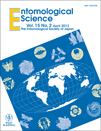
ENTOMOLOGICAL SCIENCE
Advancing Knowledge in Entomological ResearchENTOMOLOGICAL SCIENCE, published by WILEY, stands at the forefront of research in the field of entomology, focusing on the intricate relationships between insects and their environments. With its ISSN 1343-8786 and E-ISSN 1479-8298, this esteemed journal, based in the United States, has been serving the scientific community since 2005. As a Q3 journal in both Ecology, Evolution, Behavior and Systematics and Insect Science, it presents vital peer-reviewed articles that advance our understanding of insects and their ecosystems. With a Scopus rank of 85/181 in Insect Science, the journal not only reinforces the importance of insect study but also serves as an essential resource for researchers and professionals seeking to explore and disseminate knowledge in this dynamic field. Although it does not offer Open Access options, its scholarly contributions are invaluable for those invested in ecological research and entomological perspectives—making it a must-read for aspiring and established scientists alike.
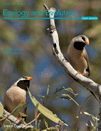
Ecology and Evolution
Connecting researchers to inspire impactful ecological solutions.Ecology and Evolution is a leading open-access journal published by WILEY, dedicated to advancing knowledge in the fields of ecology, evolution, and behavior. Since its inception in 2011, the journal has established itself as a critical platform, garnering a significant impact factor and maintaining a prestigious Q1 ranking in multiple categories, including Ecology, Evolution, Behavior and Systematics, and Nature and Landscape Conservation as of 2023. With its continuous commitment to high-quality research, Ecology and Evolution provides a vital conduit for dissemination among researchers, professionals, and students alike. The journal's open-access model ensures that groundbreaking findings are accessible to a global audience, fostering collaboration and innovation across various ecological and evolutionary disciplines. The editorial team invites submissions that explore the intricate relationships between organisms and their environments, aiming to inspire future research that addresses pressing environmental challenges. The journal's rigorous peer-review process guarantees the integrity and quality of published work, reinforcing its position as a frontrunner in its field.

ZOOLOGICAL SCIENCE
Connecting Scholars to the Heart of Zoological ScienceZoological Science, published by the Zoological Society of Japan, is a leading journal dedicated to the fields of animal science and zoology. With its ISSN 0289-0003, this respected publication has established itself as a prominent source of scientific research, attaining a commendable Q2 ranking in the 2023 category of Animal Science and Zoology. Spanning over three decades, from 1992 to 2024, the journal offers a valuable platform for scholarly articles that explore various aspects of zoology, including ecology, behavior, and evolutionary biology. Although it operates under a traditional subscription model, its contributions are supported by a robust community of researchers and professionals who value its insights. The journal strives to foster academic discourse and insights that drive understanding and conservation of wildlife, making it an essential resource for students and established experts alike. The publishing headquarters located in Tokyo, Japan, further enhances its international reach and influence in zoological studies.

ZOOLOGICHESKY ZHURNAL
Advancing the frontiers of zoological knowledge since 1950.Zoologichesky Zhurnal, a prominent journal in the field of Ecology, Evolution, Behavior and Systematics, has been a vital publication since its inception in 1950. Published by MAIK Nauka-Interperiodica in the Russian Federation, this journal has established a notable reputation in disseminating scientific research and advancing knowledge in zoology. With its coverage spanning from 1950 to 2023, and a specific convergent focus during 1982-1983, this journal contributes significantly to the ecological and evolutionary sciences, even though it currently holds a Q4 classification in the 2023 category quartiles, indicating its niche positioning among peers. Researchers and students engaged in the study of biological sciences, particularly those interested in the dynamics of ecosystems, behavior of species, and evolutionary processes, will find valuable insights and original research articles within its pages. While access to this esteemed journal is not open, it remains an essential resource for those seeking to deepen their understanding of zoological sciences.

Frontiers in Zoology
Connecting researchers for a deeper understanding of ecosystems.Frontiers in Zoology is a premier, open-access journal published by BMC that has been a cornerstone of zoological research since its inception in 2004. With a commitment to advancing the field, this journal covers a broad spectrum of topics within Animal Science and Zoology, as well as Ecology, Evolution, Behavior, and Systematics. Recognized for its quality, it holds a distinguished Q1 ranking in both of these categories and ranks within the top percentiles in Scopus, with 87th and 78th percentiles, respectively. Based in the United Kingdom, it provides researchers, professionals, and students with innovative studies and findings that encourage interdisciplinary collaboration and exploration. The journal is dedicated to facilitating the open exchange of scientific knowledge, making it an essential resource for those seeking to stay at the forefront of zoological and ecological sciences.